Bimatoprost
aka - Latisse
🛒 Where to find Bimatoprost
Tracking 1 topical product by companies like Minoxidil Express. View product »Bimatoprost is a synthetic prostamide analog initially developed for the treatment of glaucoma and ocular hypertension. Its ability to lengthen, thicken, and darken eyelashes was an unexpected side effect observed in glaucoma patients, leading to its FDA approval as a treatment for eyelash hypotrichosis under the brand name Latisse. Over time, the potential of bimatoprost to stimulate hair growth in other areas, specifically the scalp, has garnered interest within the medical community.
In the realm of alopecia, bimatoprost's mechanisms of action are thought to involve the stimulation of hair follicle activity and the promotion of the transition from the telogen (resting) phase to the anagen (growth) phase of the hair cycle. This effect is mediated through the prostamide F2α receptors found in hair follicles. Research indicates that bimatoprost can enhance hair growth by increasing the size of the dermal papilla and hair bulb, leading to thicker and fuller hair.
Research findings suggest bimatoprost's efficacy in treating various forms of alopecia, including eyelash, eyebrow, and potentially scalp alopecia. For instance, a study published in "Dermatologic Surgery" in 2010 demonstrated significant improvements in eyelash prominence, length, thickness, and darkness with bimatoprost use. Similarly, a study in "The FASEB Journal" highlighted bimatoprost's ability to stimulate hair growth in human scalp follicles in vitro and in mice, indicating a novel approach for treating scalp alopecias. Despite these promising results, more research is needed to fully understand bimatoprost's effectiveness for scalp hair regrowth, particularly in androgenetic alopecia, and to establish optimal treatment protocols.
The community's sentiment towards bimatoprost is cautiously optimistic, with interest in its potential as a novel treatment for hair loss. Discussions often focus on personal experiences, the comparison of bimatoprost with other treatments, and the exploration of its application for scalp hair regrowth. While anecdotal evidence from community members suggests that bimatoprost may offer benefits for hair loss, there is a consensus on the need for more conclusive research and consideration of cost, as bimatoprost can be expensive.
In summary, bimatoprost represents a promising avenue for hair loss treatment, initially discovered through its application in ocular conditions. Its ability to promote hair growth in eyelashes has led to exploration of its use in treating scalp alopecia, with research and anecdotal evidence supporting its potential efficacy. However, the need for further studies to confirm its benefits and establish guidelines for its use in treating scalp hair loss remains.
Research
20 / 460 results
research Enhancing the Growth of Natural Eyelashes: The Mechanism of Bimatoprost-Induced Eyelash Growth
research Bimatoprost in the Treatment of Eyelash Hypotrichosis
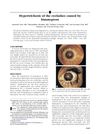
research Hypertrichosis of the Eyelashes Caused by Bimatoprost

research Lack of Efficacy of Topical Latanoprost and Bimatoprost Ophthalmic Solutions in Promoting Eyelash Growth in Patients with Alopecia Areata

research The Prostamide-Related Glaucoma Therapy, Bimatoprost, Offers a Novel Approach for Treating Scalp Alopecias

research Bimatoprost for the Treatment of Eyelash, Eyebrow, and Scalp Alopecia
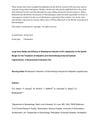
research Long-Term Safety and Efficacy of Bimatoprost Solution 0.03% Application to the Eyelid Margin for the Treatment of Idiopathic and Chemotherapy-Induced Eyelash Hypotrichosis: A Randomized Controlled Trial
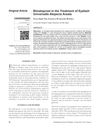
research Bimatoprost in the Treatment of Eyelash Universalis Alopecia Areata

research Bimatoprost Versus Mometasone Furoate in the Treatment of Scalp Alopecia Areata: A Pilot Study
research Characterization of an In Vivo Model for the Study of Eyelash Biology and Trichomegaly: Mouse Eyelash Morphology, Development, Growth Cycle, and Anagen Prolongation by Bimatoprost

research Therapeutic Potential of Bimatoprost for the Treatment of Eyebrow Hypotrichosis

research Instilled Bimatoprost Ophthalmic Solution in Patients with Eyelash Alopecia Areata
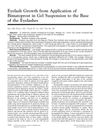
research Eyelash Growth from Application of Bimatoprost in Gel Suspension to the Base of the Eyelashes

research Management of Hypotrichosis of the Eyelashes: Focus on Bimatoprost
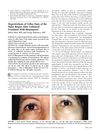
research Hypertrichosis of Vellus Hairs in the Malar Region After Unilateral Treatment with Bimatoprost
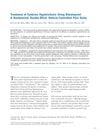
research Treatment of Eyebrow Hypotrichosis Using Bimatoprost: A Randomized, Double-Blind, Vehicle-Controlled Pilot Study

research Acquired Trichomegaly of the Eyelashes and Hypertrichosis Induced by Bimatoprost

research Safety and Efficacy of Bimatoprost Solution 0.03% Topical Application in Patients with Chemotherapy-Induced Eyelash Loss
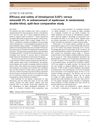
research Efficacy and Safety of Bimatoprost 0.03% Versus Minoxidil 3% in Enhancement of Eyebrows: A Randomized, Double-Blind, Split-Face Comparative Study
